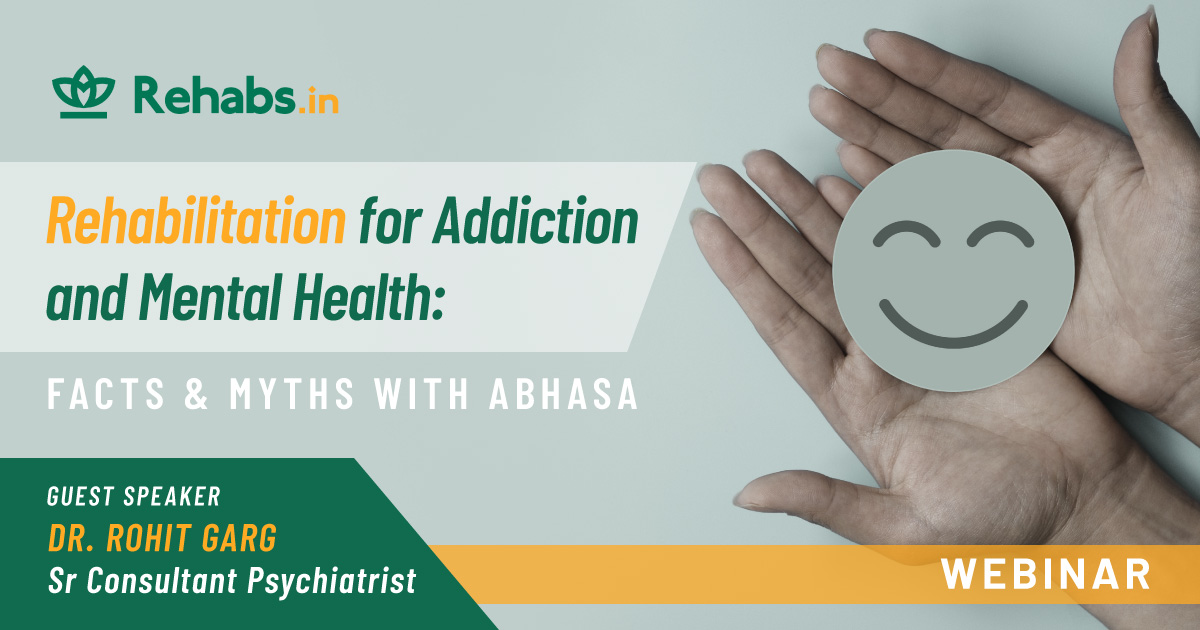Rehabilitation for Addiction and Mental Health: Facts and Myths with Abhasa

Our weekly webinars talk about various industry scenarios and challenges of rehabs across the country and the de-addiction and mental health challenges the mental health community faces and people in general.
In the fourth webinar of a new 2021 series, we invited Dr Rohit Garg – Psychiatrist at Abhasa Rehabilitation Centre. The webinar was hosted by Ms Akansha – Assistant Project Manager of RehabPath, India, who was assisted by Ms Rajnandini – Editor of RehabPath, India and professional psychologist.
In this webinar, Dr Rohit Garg debunked many myths surrounding rehabilitation for addiction and mental health.
You can read the summary of the webinar below or you can watch it online here.
Rajnandini: Please introduce yourself to our audience.
Dr Garg: I am a practising psychiatrist in Delhi. I have been in this field for more than 12 years now. I have worked in eight states of the country and checked more than 60,000 patients to date on a charity basis and conducted multiple camps.
Our works have been acknowledged not only on Indian platforms but outside as well, one being the House of Lords, London for our rural initiatives. I belong to the state of Punjab and we all know the gravity of addiction in the state. This is what we do on a large scale and makes me passionate about my work in the field of psychiatry.
Rajnandini: Could you please tell us about Abhasa and its approach to addiction recovery?
Dr Garg: Abhasa means constantly working on yourself. I believe that anything and everything in our lives is exercise, be it your physical health, body, or your goal. We believe in consistently working towards our health or goal. When it comes to rehabilitation or addiction, we believe that recovery is a lifelong process. That’s where Abhasa comes in. We also saw there is a lack of compassion and understanding of the problem. When patients go to a rehab centre, they all go through a similar program.
We know that the needs of every individual are different. If 20 people are living under one roof, it does not mean that they also need the same program. We thought of individualizing the programs for better benefits. That’s how Gayatri founded Abhasa and I joined in as a medical professional to guide them through different processes.
Our first centre was started in Coimbatore where we saw very good results. We can not say that we had a 100% rate but relatively Abhasa has brought a significant change in the lives of many people.
Rajnandini: What do your basic treatment plans look like?
Dr Garg: First, I want to make people understand the actual meaning of rehabilitation. The word rehabilitation has already a stigma attached to it. It is not just for addiction but if you visit any centre for yoga or to lose weight or anything, it is also a part of the rehabilitation.
Rehabilitation means getting the best out of you, exploring your capabilities, living, performing, and syncing in with society. It also means overcoming your limitations. Any person who has had a stroke, delivered a baby or faced other challenges needs rehabilitation. It is not limited to addiction or mental health challenges.
With these concepts in mind, we have developed multiple programs at all our centres. I’m also part of “Door of Hope” in Delhi where we follow a similar approach.
When we individualize programs, we make sure that they explore societal aspects as well because they will eventually be going back home and interacting with other people. It can be difficult for some people to be back in their natural environment and behave a certain way. For example, a person is consuming a substance or alcohol. When he is in rehab or any confined environment, we do not see any such behaviour. As soon as he moves out, he may relapse or crave.
Besides having programs and activities at the centre, we also introduced outside programs like picnics, hiking, or short treks. We do this so people could feel normal and in control of their emotions even outside the confined environments of rehab. It has shown good results.
Rajnandini: Besides individualized programs and outdoor activities, is there anything else that makes Abhasa unique?
Dr Garg: There is a lot of human interaction at Abhasa, be it talking with the counsellors, therapists, or interacting with the people who stay at the facility. We know it is not only the person who is staying at the facility, even family members need to understand what their ward is going through and how to improve. There are many behaviours from the individual and family that can cause relapse. High importance is given to the family’s psychoeducation.
In most centres, the baseline behavioural, emotions, or psychiatric disorders are not looked at. Let’s say a person has an alcohol addiction. Most centres will look into their addiction aspect but not their mental health issues like anger, anxiety, or depression. Unless we treat these issues, it is difficult to treat the consequence that is alcohol addiction.
Strong importance is also given to the overall assessment of the person. We had a case where a person came from Goa where he was admitted for cannabis addiction for over a year. When we evaluated him, we found that he was suffering from psychosis. His major problem was schizophrenia and not cannabis. Once we treated his schizophrenia, cannabis addiction stopped gradually.
Hitting the right point becomes important when it comes to addiction and mental health issues.
Rajnandini: Are you planning to expand to other cities in India?
Dr Garg: Rehabilitation is an unexplored sector. Not many people know or understand it and that’s why needs are not fully met. With the current situation of addiction and its abuse, I’m sure that mental health issues are going to increase. There is a need for centres that can do a better job and give results.
So, we are starting with a new place in Karjat with proximity to Mumbai, Pune, Lonavala. We can have more than 50 activities like trekking, sightseeing, and everything else. People can make these activities their obsessions rather than drugs or alcohol. There is also space for organic farming. We are planning to have our organic food and even livestock for better access to daily consumption items.
People have to find their passion or interests to get over their addiction. After Mumbai, we will plan to expand further in and around these cities. We also want our services to be affordable and available for all sections of our society.
Living in a good rehab is an expensive affair. Since people may have to be admitted a few times before they completely get out of it, we keep these aspects in mind to offer our services to all sections of society.
Even right now at Abhasa, we have taken care of a lot of things or services that were not affordable for some people. We subsidised their treatment plans and took care of other expenses. Abhasa is not just about this but also helping people who need it.
Rajnandini: Has your new facility started?
Dr Garg: Because of the lockdown, there have been delays. From the 1st week of October, we have started our Karjat facility now. It is a beautiful and peaceful location in the middle of nature. You may not need ACs by the time the sunsets. The environment of any place helps people recover better. We are also trying to offer Ayurvedic massage therapies. Our dining area faces the valley. You know it feels good to sip a cup of tea while looking at our beautiful nature. I hope we continue doing good there as well.
Rajnandini: Coming back to today’s topic, what are some myths around rehabilitation? The first myth I have is that addiction cannot be cured as it is a moral problem. What do you say about it?
Dr Garg: Addiction is not just a behavioural problem. It has been proven scientifically that addiction is a disease. It also has a genetic component attached, which means if one member of your family has it, you are also likely to develop it over time. It is similar to cancer, hypertension, and diabetes.
However, people and society consider addiction a moral problem like the person doesn’t want to quit or cannot quit and it is how they start treating them badly. The truth is even if the person wants to get better, it is difficult because of those biological and chemical changes in our body. We have a reward circuit in our brains. As soon as it gets triggered, the dopamine is released and the craving comes back. Along with this, there are also many personality and behavioural issues.
Rajnandini: Another popular belief among people is that only a certain type of person can develop addiction-like people from a certain part of society or gender.
Dr Garg: You can have a 4-year old child with diabetes. You can also have a 28-year old person suffering from hypertension. Addiction being a disease is not limited to any particular strata, age, or gender. We get cases of 12-year old children having inhalant abuse problems. We also have cases of 60 to 70-year-old people with alcohol problems or nicotine and tobacco.
It is no more about gender today because even in women, there has been an increase in the consumption of substances, especially when it comes to cannabis, smoking, or alcohol. Most people think cannabis is natural or organic and is being prescribed in countries like Canada. However, people don’t realise that it is being used medically for certain disorders. If it is being used for cancer, you don’t have it.
People also don’t understand that everyone is not getting cancer because of tobacco. If 100 people are smoking, 10 people are getting cancer. The other 90 will never say cigarettes can cause mouth cancer or any other disease. We have had cases where people have suffered from cannabis-induced psychosis or behavioural changes.
All strata of society – rich or poor – develop addiction by overconsumption or regular consumption for a long time. It is wrong to think only the lower strata of the society gets it, even the riches have not been spared.
Rajnandini: Another belief or myth about mental health and addiction is that only when they hit the rock bottom, they should go to a rehab centre. Is this correct?
Dr Garg: Any problem treated at the right time always gives the best results. People think that rehabilitation is only to do away with chronic problems. However, rehabs also treat acute problems. For instance, a person had an episode of psychosis or panic because of their substance abuse. The person needs acute help then and there. But it doesn’t happen this way unless they reach rock bottom.
Even the family members ask us how we can send our child to rehab or how they will live without us, what will other people think, and similar. Unfortunately, they do it as a last resort. Believe me, 90% of the calls we receive are SOS/ emergency. I wish it was the opposite.
At such a point, treatment or prognosis becomes difficult. You don’t go to a hospital if you are having a heart attack that is a consequence of high BP. You will work on lowering your blood pressure or cholesterol before suffering a heart attack. A pregnant woman regularly follow-ups with her doctor and it is how addiction should be treated for getting better outcomes, not when it is SOS. Suppose if the lady visits just before her delivery date, there may be complications. It is better to keep a check on your health from day one. If you have problems, acknowledge them and take proper treatment at the right time.
Do not take this call when it is your or your loved one’s rock bottom because by then, the person may have lost a lot of time, finances, or respect. It becomes difficult to come out of such situations as it involves greater trauma.
Rajnandini: People believe that rehabs are unaffordable and instead, they can cure themselves at home. How true or false is it?
Dr Garg: To be truthful, good rehabilitation centres need multiple facilities. Apart from basic infrastructure, it needs different medical professionals and other in-house facilities. There are not many rehab centres operated by the government. It comes at a cost for sure but many rehab centres come at a cheap price. However, these centres may not be able to give you the best of facilities. In the end, I believe that one should seek help irrespective of the prices of all these rehab centres. Afford whatever you can and seek help.
But I will suggest, you must always look out only for those centres that have either a psychologist/ psychiatrist or a clinical team attached. Many centres are more like detention centres for addicts than rehab. While people may talk about it at the facility but no action is taken upon them.
There are only a few less expensive rehab centres that offer full facilities. For a moderate rehab centre with full facilities, the costs can start from 50 to 60 thousand per month. There are also luxury centres and similar things coming up whose need I fail to understand at the moment.
Like IQ, there is a Willing Quotient (WQ) as well. If you are not willing to do anything, you will always find excuses to avoid it. They do not realise the amount of money they’ve spent on substances is higher than that. The overall impact of illness on finances and relationships are huge. Recovery is a lifelong process and getting into rehab is only the start of it.
As I said, we are planning to bring better clinics and facilities that can cater to the needs of all sections of our society.
Rajnandini: Can people treat addiction on their own rather than going to a rehabilitation centre?
Dr Garg: I think all of us need one person to hold our hand and walk us through. Sachin Tendulkar is a well-known cricketer but he also had a coach. If you need to learn something, you go to a school or teacher. A person with addiction reaches a point where they cannot think rationally for themselves. There are communities like AA and NA in which I strongly believe. Their presence is all across the globe.
These support groups have recovered addicts and volunteers who work without any charges only to help others. If a person is not willing to go to rehab, they can contact their local AA, NA community online and start attending sessions. They will have more than one person to help them come out of their addiction.
There is no such thing like we can do it on our own. People visit us and say, “We do not drink during Navratri. Therefore, I can quit it anytime.” But we don’t realise, in the end, they are waiting for that next day when they can drink.
I don’t think any person should or can do it alone as we all need that one person to hold our hand.
Rajnandini: One popular belief I came across is that one must be religious for rehabilitation to work. Is it true?
Dr Garg: No. Even when people have sessions where they are asked to experience the higher power, religion or god has nothing to do with it. Higher power is surrendering to yourself, your honesty, mentor, or weakness of not being able to control the addiction. All centres I’m associated with do not have any pictures of gods or goddesses. They believe in honesty and truth.
Rehabilitation centres have clinically approved programs and are not associated with any religious aspect.
Rajnandini: Another myth is that rehabs are restrictive and force you to quit cold turkey. How true is it?
Dr Garg: You have to go cold turkey in general. There is no such thing as ‘I will quit slowly.’ Once you have entered the stage of addiction or dependence, it is next to impossible to achieve something out of it. Withdrawals that are a result of going cold turkey are prevented with proper medications.
Most people tell me that we can’t sleep. If that’s the reason, I tell them I will put you to sleep if only you are ready to quit alcohol. You cannot go cold turkey at home because withdrawals can get severe and sometimes fatal.
When it comes to tobacco, many rehabs allow a measured quantity of smoking or they replace it with nicotine patches or gums. Over a period, we urge the clients to quit it as well. Tobacco is the most difficult addiction any person can have that has severe withdrawals.
If I have been drinking for five years continuously and one day I decide to quit, I will have severe withdrawals. To counter that, I will relapse. If that happens to anyone, they will surely say that they cannot quit ever again in life.
If you are given proper medications for any type of addiction severity, believe me, you will never face such challenges. No one should be scared of taking help anytime.
For another part, there are restrictions in a rehab centre in terms of movement, routine, or discipline. It is because one needs to focus on recovery and not get distracted by these things or what is happening in the outside world. Besides, there are individual programs wherein one can work for a limited period of the day if they don’t want to take a break from their work or business.
Moreover at Abhasa, we want equal engagement of the patient’s family as well. It is done through periodic family therapy sessions. Rehabs are restrictive only to an extent that is required for their recovery.
Rajnandini: If someone treats their mental health, their addiction problem also gets better. Is it a myth or a fact?
Dr Garg: Both these things go hand in hand. If you have an addiction issue, you will have an unhealthy mind and vice-versa. There is a hormone in our body called cortisol that increases during stress, which can further lead to relapse. We have often seen people drinking or smoking more under stress. For illnesses like bipolar or mania, people cannot think logically.
Some people consume alcohol before going to a party where they need to interact with other people thinking it will ease them out. But why can’t we work on basic things like anxiety and not take the help of alcohol to interact with people. That’s how a person grows alcohol addiction and worsens their mental health or vice-versa.
I believe mental health and addiction must be addressed at the same time if you have them. However, solely treating mental health cannot lead to recovery from addiction or reduce its extent.
Rajnandini: Another myth is that rehab is only for people who cannot quit. How true is it?
Dr Garg: No, it is false. We have all the voluntary admissions. Rehab is about a holistic approach to addiction that also includes their families. There are ten people to hold your hand through the recovery. Going to a rehab is not only about people who cannot quit but for all. You can call any rehab centre, ask them these questions, and a lot will be clear to you right there.
Rajnandini: Last myth is people believe that rehab will not work for them the second time. Please clarify this for our audience.
Dr Garg: Relapse is common with addiction. I would rather say the opposite – one should go for multiple rehabilitation attempts to get the most out of it. If there is one flop song or movie, the artist tries for another and then another until they succeed.
Every time you visit a rehab centre, you will work on your different aspects for recovery. So, keep going there until you have overpowered the weakness that makes you relapse.
Rajnandini (Question from participant): What if a person gets addicted to staying at a rehab?
Dr Garg: In case, staying outside is healthy or deadly or your addiction is killing you, it is fine to stay at a rehab. Going by this question, many times people stay in rehab, relapse, and then come back. I believe that is what they are referring to and this behaviour has been seen in only a few people. Such cases always arise when there’s an addiction trigger within the family. When advice is given to these families, they will not apply them. Hence, the person relapses and comes back to the facility.
For our patients, we do offer daycare programs where they can interact with others or volunteer. However, this transition takes time. Till the time you complete one year of sobriety, you are not out of it. It takes time but it does happen.
Rajnandini (Question from participant): Can someone go to rehab only for depression or mental health issues?
Dr Garg: Yes. As I said, rehab is not only for addiction but for mental health issues as well. Even if you have a relationship or phone addiction, it falls on the same spectrum and is treated equally. Rehab as a concept means getting over your problems to get better.
Rajnandini (Question from participant): How long can a family member stay at Abhasa during the treatment of their child or loved one?
Dr Garg: Most of the family members have reservations regarding different things like safety, processes, medication, and similar things. It is especially the case with female patients. In such cases, one family member can stay at the facility with the patient. As soon as they see their ward getting comfortable at the facility, they leave. Usually, they stay with us for a week or two. If someone wants to stay for long, they are welcomed. However, if it interferes with the recovery process of the patient, they are asked to leave. In the end, our interest is the recovery of the patient.
Akansha: Please share your message with us if any.
Dr Garg: The only message I give to people these days is to vaccinate yourself against the stigma of mental health. People have been vaccinating themselves for COVID-19, why not this. Help yourself and others. There was a time when people used to think about how psychiatrists look or what they would do. We are normal people like you.
You can reach us at any of our social media platforms to talk about anything related to rehabs. You can also contact me on my clinic’s (Mind Vriksha) social media pages. We would love to interact with you all and break the barriers of social stigma.
If you have any other substance abuse problems, get help as fast as you can. Go to your nearest psychiatrist or a rehab centre and get the help you need. All the rehabilitation centres are open.
For more webinars like this, follow us on Facebook.











